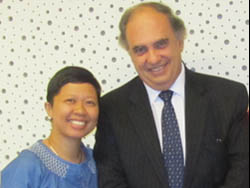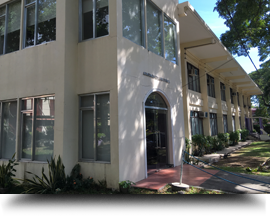
 Sometime in March 2011, I received an invitation from the International Institute of Human Rights in Strasbourg, France to attend a summer session in International and Comparative Human Rights Law in July. I first pondered on the thought of being away from work and family for 4 weeks. My husband, however, prodded me to submit my resume for consideration. If I get accepted, maybe it is for me.
Sometime in March 2011, I received an invitation from the International Institute of Human Rights in Strasbourg, France to attend a summer session in International and Comparative Human Rights Law in July. I first pondered on the thought of being away from work and family for 4 weeks. My husband, however, prodded me to submit my resume for consideration. If I get accepted, maybe it is for me.
By early May 2011, I surprisingly got a letter in my mail on my acceptance. Still, I was in doubt as there was so much going on in work and family that time that leaving would seem difficult. To make the long story short, despite all the challenges, I took the flight to Amsterdam then Frankfurt then Strasbourg and attended the course. I am thankful to Silliman University , my partners at EDLaw and my ever-supportive family for this opportunity.
It is summer here but the downpour frequents. Probably the wettest summer I have yet undergone thus far. The program is housed at the Escarpe Building of the Universite de Strasbourg and has some 200 lawyers, law students, paralegals and human rights consultants in attendance from some 80 countries worldwide. There are 3 Filipinos from the Philippines: myself, Mark Taguinod from the Supreme Court and Krizna Gomez from the Ateneo Human Rights Center, and 2 from the United States (San Francisco and Hawaii) but of Filipino parents, who are both law students.
This year’s list of speakers excite us. We have experts from practically all human righs fields. Opening Program Speaker Mr. Olivier de Schutter is the UN Special Rappeurteur for Food Programme. Internal Court of Justice and former President of the Inter-American Court of Human Rights Justice Candido Trinidade (herein photo) spoke on the justiciability of social rights under all regional human rights mechanism. His pristine theories on the subject kept me in awe. He says there should be no pragmatists in human rights practice and absolutely abhors the famed divisibility regarded by the international community of economic, social and cultural rights vs. civil and political rights. I also loved the intellectual discources of Prof. Besson from the University of Fribourg in the Netherlands when she outlined the tautological framework of social rights theory indicating that the recent debate on social rights stems from the notion that at best, they seem to be mere ideals than justiciable subjects. I so look forward to Judge Fausto Focar’s (Chair of the International Criminal Tribunal for the former Yugoslavia) lecture on July 18 on International Criminal Law and no less than Nathalie Weizman from the ICRC on International Humanitarian Law. Nathalie’s works on IHL I only get to read online. I will certainly take their pictures to show our law students studying the subject.
Listening to experts on legal subjects is such an enriching experience. It is as beautiful as internalizing the beauty of 14th century German and French achitecture here in Strasbourg or touring the artifacts and artworks at the Louvre. Truly, learning brings one to a different level of existence where utopia meets nirvana and the pragmatist might as well sleep.
Of course, the quest for human rights for all is a work in progress. The recent developments in the field include a regional mechanism for Asia ( the ASEAN Human Rights Mechanism), the allowance of individual complaints in all regional mechanisms and other regional bodies for regional treaties such as the CEDAW, Convention against Torture and Non-Discrimination and the declaration of the right against discrimination as jus cogens. It is good to note that the first Asian case on the CEDAW was won by no less than good friend Atty. Evalyn Ursua (a former classmate in Human Rights study) which makes the Philippines in the forefront of protection of women’s rights.
I am here to learn more of the legal complexities that abound in our world in the hope of becoming a better lawyer and person. On the side, I still do work for the institutions that I serve and am happy to do it during my free time. Apart from learning, I am also here to commune with other cultures and nationalities of the world who, despite all our inherent differences, all thirst for some kind of equality and non-discrimination. Every individual is unique. This, to me, is the greatest message of this exercise.
– by Myrish T. Cadapan-Antonio

